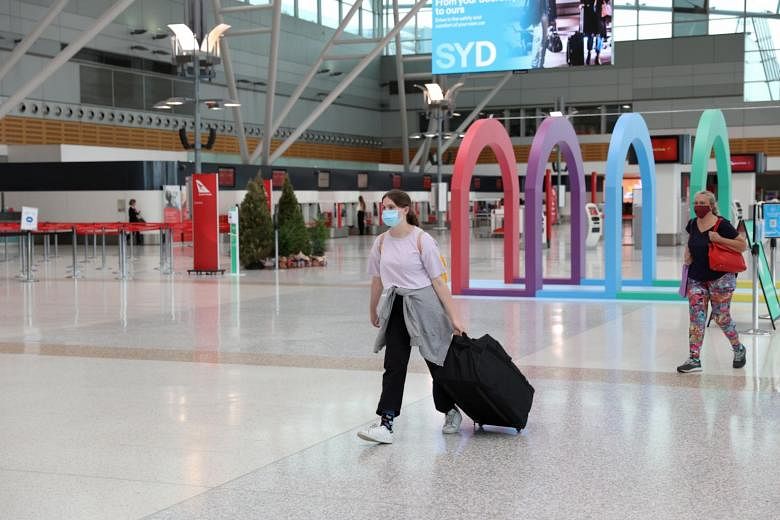SYDNEY - For the first time in more than a week, a new locally-transmitted Covid-19 case was detected in Australia on Friday (March 26) after a 26-year-old man tested positive in Brisbane.
In typical fashion, it sent the authorities into overdrive.
The state of Queensland, where Brisbane is located, banned visits to hospitals and retirement homes and requested that all social engagements be held outdoors, while some other states required all those who had visited specified areas in Brisbane to undergo testing and quarantine.
These swift and immediate measures have been typical of Australia's response to Covid-19 cases.
Previous cases have led to sudden lockdowns of entire cities. In February, for instance, the government in Western Australia, imposed a lockdown on the state capital, Perth, which has a population of about two million people. It cost the state as much as A$500 million (S$513 million). The lockdown was ordered after the discovery of a single community-transmitted case - and no further cases have since been detected.
Curiously, Australia, which prides itself on its laid-back and easy-going national temperament, has proven to be one of the world's strictest countries in dealing with the Covid-19 pandemic.
Australia is believed to be the only country that has banned its citizens from travelling overseas. To go abroad, people must request an exemption from the Australian Border Force.
The country has also imposed curbs on international arrivals, allowing entry only to Australian citizens, residents and their immediate families. All arrivals must quarantine for 14 days, typically at a specified hotel and at their own cost.
But the authorities have also placed caps on the number of international passengers admitted each week, which has left thousands of residents stranded aboard. The caps were imposed to ensure hotel quarantine facilities were not overburdened. But this has led to steep flight prices and made it impossible for some Australians to return.
An Australian mother, Ms Georgina Trigg, who is in Dubai with her family, this week recounted having a flight cancelled at the last minute - for the third time - just as they were preparing to fly back in April.
"When this latest flight was cancelled, we were exhausted and shattered," she told ABC News.
There are about 37,000 Australians who are overseas and want to return. The cap on places has even prompted rebukes from human rights groups.
Amnesty International released a report late last year, urging Australia to increase quarantine capacity and allow home quarantining where possible.
"The stranded Aussies are people separated from their families, people who have been unable to be with sick or dying relatives, people who have missed the birth of their child, and people that have been left jobless and homeless in other countries," said the organisation's national director, Ms Sam Klintworth.
Australia has been successful at containing the pandemic, aside from a serious outbreak in Melbourne last year. As at Friday, the country had recorded 29,239 cases and 909 deaths. Life everywhere has largely returned to normal, and unemployment levels have almost returned to pre-pandemic levels.
But the country has struggled to prevent occasional lapses at quarantine facilities. Security guards and hotel workers have repeatedly become infected, sometimes leading to further community-based transmissions.
Health experts have called on the authorities to do more to prevent airborne transmissions. Some experts believe quarantine facilities should effectively be treated as clinical environments with workers using high grades of personal protective equipment such as face shields.
Rules at quarantine facilities are set by the state health authorities. Some states have upgraded ventilation systems and introduced face shields and daily testing.
A clinical epidemiologist, Professor Nancy Baxter, from Melbourne University, said this week that all workers at quarantine facilities should be vaccinated and that further safeguards must be adopted to prevent airborne transmission.
"We need to make sure that the ventilation has been assessed in all these hotels and is appropriate, and we need to make sure the workers are protected so they have the right masks and they're fitting properly," she told 3AW Radio.
Despite having some of the most onerous measures in the world, however, there has been little public resistance to them. Instead, the strict measures have largely met with strong approval.
Western Australian Premier Mark McGowan, for example, who has been the most stringent among state premiers in his response to the pandemic, faced an election on March 13. He led the ruling Labor party to a historic landslide victory, winning 53 of the 59 seats in the state legislative assembly.












